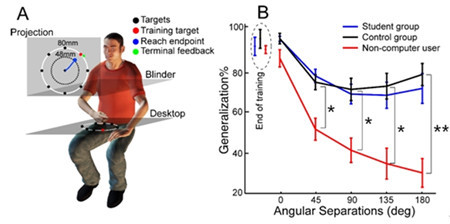In modern society, humans make extensive use of computers, networks and various electronic products. However, what changes will these modern technologies bring to people's cognitive ability and brain plasticity? It has become one of the current research hotspots in cognitive science and neuroscience. Associate Professor Wei Kunlin and his team from the Motion Control Laboratory of the Psychology Department of Peking University studied the impact of computer use from a new perspective: the interaction with the computer screen affects the generalization of motor learning. The research results were published in Current Biology magazine, and the "Science" magazine website specifically explained the significance of the article.
In a series of studies in the past few years, the Motion Control Laboratory of the Department of Psychology of Peking University found that the generalization of motor learning is affected by top-down neural regulation, especially the familiarity of tasks can increase the extent of generalization of motion (Yan et al., 2013, Journal of Neurophysiology). At the same time, we recognize that modern people are very familiar with the use of computers. The average computer user clicks more than 7000 times a week. The interaction with the computer generally depends on the use of the mouse. The movement control of the mouse is peculiar, because the movement plane and the display plane are separated, and there is a certain linear mapping relationship between the hand movement and the cursor movement. The long-term movement under this artificial mapping has caused the modern people to change the neural representation of this kind of perceptual motion mapping. Wei Kunlin's team (including graduate students Yan Xiang, Kong Gaiqing, and Yin Cong) through a series of psychophysics experiments found that for people with or without computer experience, their learning rate for perceptual motion mapping is the same, but their motor learning The directional generalization (from the generalization of motor skills learned in one direction to other directions) is very different. The generalization range and breadth of people who have used computers are higher than those who have not used computers (Figure 1 below). More importantly, people who have never used a computer can improve the generalization of their movement through just two weeks of computer training (especially using a mouse).

Experimental setup (A) and partial results (B): Participants learn direct mapping of hand movements and cursor movements in desktop virtual reality, learning in one direction is generalized in other directions, and the results show that subjects who have used computers It is more significant in the extent and breadth of generalization.
The study shows that computer use has changed people's basic ability to perceive movement and their neural representations. At the same time, the study has a certain warning effect on current neuroscience research: the majority of the subjects used in the study are computer users, and the computer experience of these subjects may affect the results of the sensory exercise experiment, so the computer experience should be the experiment Control factors to be considered in the study. In addition, the study shows that the advanced learning component represented by generalization of movement is possible in a new learning situation that can be mastered and used by the central nervous system in a short time. This theoretical breakthrough may have a guiding significance for the clinical practice of sports rehabilitation: because the advanced components related to sports learning can be learned by the central nervous system during long-term training, the rehabilitation training of simple sports tasks in the clinical background can be migrated to daily sports Task.
This work provides new ways and ideas for the study of the field of perceptual motion and the nature of motor learning. This series of work is funded by the National Natural Science Foundation of China and the Peking University 985 project.
Glass Hand Pipes,Cherry Polymer Clay Hand Pipes,Glass Dab Rigs Christmas Gift,Glass Smoking Accessories
ShanXi Hippies Glass Tech. Co., Ltd. , https://www.hippiesglass.com